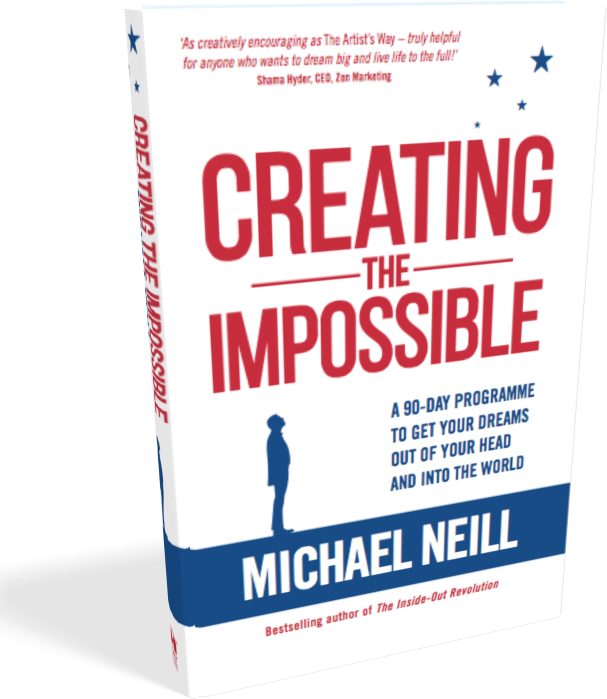One of fascinating things about the inside-out understanding – the fact that our personal realities are made up of thought – is that it lets us take a look behind the scenes of the human experience and make sense of why we’re happy and effective when we’re happy and effective and why we’re not when we’re not.
I was thinking about this recently while coaching a client around some difficulties he was having with family members over the holidays. He forwarded an email to me from his mother-in-law which read like a grocery list of complaints about his wife, asking for his help in a longstanding argument over how best to bring up her grandchildren.
As “her grandchildren” also happened to be his children (not to mention the fact that his wife happened to be their mother), he took the whole thing rather personally and seemed offended that I didn’t immediately take his side in denouncing his mother in law as the selfish self-centered woman he felt the email (and years of experience) showed her to be.
The question I asked him – did he want to be right, happy, or effective? – effectively hit pause on his ruminations and he got quiet and a bit reflective before asking me to say more. What follows is hopefully a bit more eloquent than what I actually said to him, but points to the same place I was attempting to get him to look…
1. Would you rather be right or happy
The origins of this question, a popular one in the worlds of self-help and recovery, seem to be with a paragraph from the modern spiritual classic A Course in Miracles. Here’s the full passage:
“Seek not outside yourself. For it will fail, and you will weep each time an idol falls. Heaven cannot be found where it is not, and there can be no peace excepting there. Each idol that you worship when God calls will never answer in His place. There is no other answer you can substitute, and find the happiness His answer brings. Seek not outside yourself. For all your pain comes simply from a futile search for what you want, insisting where it must be found. What if it is not there? Do you prefer that you be right or happy? Be you glad that you are told where happiness abides, and seek no longer elsewhere. You will fail. But it is given you to know the truth, and not to seek for it outside yourself”
As I interpret it, this points to the fact that our wellbeing (happiness, peace, ‘heaven’) is innate and not contained in any of the people or objects (i.e. ‘idols’) we project it onto. As soon as we imbue any external person, place, or thing with our internal ideas of good/bad/right/wrong, we set that ‘idol’ up to be in control of our happiness. Since it doesn’t actually work that way, those people, places, and things will inevitably let us down and leave us disappointed, disillusioned, and unhappy.
By contrast, when we separate out our happiness from our circumstances, we recognize them as two independent variables, only connected by simultaneity and never by causality. Or to put it more simply, when we don’t take our thinking about the way things should be so seriously, we’re free to be happy and enjoy our lives as they unfold.
As the mystic poet Rumi wrote:
Out beyond ideas
of wrongdoing and rightdoing,
there is a field.
I’ll meet you there
When the soul lies down
in that grass,
the world is too full to talk about
Ideas, language
– even the phrase “each other” –
do not make any sense.
As we spoke further, my client began to see how his righteous insistence on the ‘rightness’ of his thoughts were actually clouding his ability to feel the love and peace that are ever present and continually available inside us. The light came back on in his eyes, and in his mind, the issue was resolved. Which is why it startled him when I asked him what he was going to do about his relationship with his mother in law.
“I don’t need to do anything about it”, he said. “I feel fine now.”
“It’s great that you feel fine”, I replied (and meant), “but do you really want to keep living with so much unrest in your family?”
2. Would you rather be happy or effective?
I recently read a wonderfully insightful business book called Extreme Ownership by two former Navy Seal commanders, Jocko Willink and Leif Babin. The essential premise was that if we’re willing to take “extreme ownership” of our circumstances, we’re better placed to effectively impact them.
In the authors’ words:
“On any team, in any organization, all responsibility for success and failure rests with the leader. The leader must own everything in his or her world. There is no one else to blame. The leader must acknowledge mistakes and admit failures, take ownership of them, and develop a plan to win.”
When I was sharing this idea with my client, he said “Hang on – I get how my wanting to be right might get in the way of my being effective, but how is my being happy an obstacle? I would think if anything it would make me more effective.”
I agreed that in most cases, a clear mind leads to better decisions and more impactful actions, but pointed out that in his case, the relief he felt at not being upset any more didn’t change his fundamental notion that his mother in law was to blame for the conflict around how his children were being raised. Effectively, he now accepted her craziness instead of making himself miserable about it, but he never questioned the notion that he was right and she was crazy.
I then shared an experience I had when I was working on my new book, Creating the Impossible. Having written five books previously and edited more than half a dozen more, I was used to feeling pressure and stress as the publisher’s deadlines approached. With this book, however, I noticed I felt almost no pressure or stress around the deadline, to the point where for the first time in my writing career, the deadline came and went without my delivering a book.
As the next deadline approached, I again marveled at the fact that my understanding of the source of my own wellbeing was so deep that I still felt no pressure or stress despite being in danger of missing a second deadline and delaying publication even further.
It was then that I had a new thought that struck me dumb with its simplicity:
It’s great that you’re not stressed, but how’s the book coming?
I realized in that moment that I’d confused the relief of not feeling stressed with the resolution of my problem – I had agreed to deliver a book by a certain date and had yet to do it.
What emerged in the aftermath of that insight was the fascinating experience of working incredibly hard to get the book done without the stress and pressure I normally associated with that kind of hard work. Or to put it another way, it turned out that my level of wellbeing or lack thereof was independent of my level of productivity.
When we brought the conversation back round to my client, he quickly realized that neither his righteous anger about his mother in law’s email nor his relieved peacefulness when he saw that a letter couldn’t possibly be the source of his feelings brought his situation any closer to resolution.
We finished the session there, but he emailed me the next day to say he’d decided to take “extreme ownership” of the family situation and stop blaming his mother in law, his wife, or even himself for the ongoing conflict. He reached out to his mother in law and arranged to bring the kids round to see her as a first step in healing the relationship and building a stronger bond with her that might one day lead to better (and easier) communication. He’d also taken it on himself to apologize to his wife for any perceived lack of support of her, and explained his commitment to the kids having the best possible upbringing with as much love and support as they and the extended family could muster.
How does this all apply to you?
If it isn’t already apparent, here are a few questions that might help connect the dots…
1. Is there anywhere in your life where your mood and/or effectiveness seem to be at the mercy of other people or external events?
2. How would it be different if you were able to separate out your opinions (i.e. your thinking), your wellbeing (i.e. your true nature), and your ultimate outcome – how you’d like the situation to be different or what you’d like to create instead?
3. What would it be like to take “extreme ownership” of the situation and take responsibility for developing the skills and relationships necessary to reach an effective outcome?
When all else fails, perhaps this reminder from Creating the Impossible will prove useful:
Don’t believe everything you think.
With all my love,
![]()


 Now available worldwide from these retailers and all bookstores
Now available worldwide from these retailers and all bookstores



